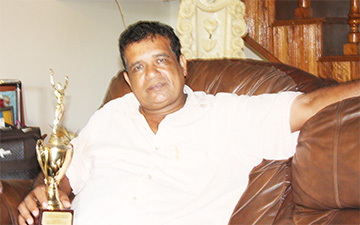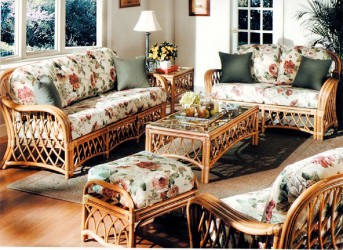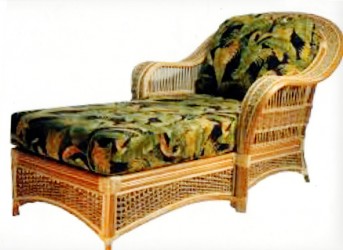The ten pieces of exotic cane furniture which Prainroop Prasad took to GuyExpo two weekends ago were all sold. The Essequibo-born Eccles-based businessman regards this as a good sign.
GuyExpo served as the relaunching of his business, Samuel’s Wicker, Rattan and Upholstery Establishment. It has been created in 1998 and between then and 2004, when the business was forced to close its doors, he had exported millions of dollars in furniture to several Caribbean territories including Barbados, Trinidad and Tobago, St Kitts and Nevis, Grenada, Antigua and Barbuda and Suriname.
The regional market accounted for about 80 per cent of his business, so that when the influx of much cheaper furniture started during the early 2000s he closed the business and went into sawmilling.
To manufacture some of his furniture, Prasad must have access to kufa, the remarkably sturdy parasitic vine that wraps itself around the trunks of huge trees. Periodically, Prasad travels to locations that include Siriki and Karawab in the Pomeroon River and to the Barima-Waini area where he buys the material from harvesters. Kufa is sold at $5,000 per 200 ft. It takes a day

to harvest that amount of the vine and Prasad is hoping that his prices will keep the harvesters away from the ‘gold bush.’
The processing of the vine begins with a de-barking process after which it is soaked in a detoxifier. Further detoxification is achieved through steaming after which it is ready for the production process. At this point it is sufficiently pliable to be worked into different shapes yet sturdy enough to be made into chairs and beds.
The wicker vine (commonly known as nibbi), which is popular in the Amerindian craft industry is also used in the manufacture of various types of furniture.
Prasad said he started out with four wallaba posts, a tarpaulin and $30. In the years following, he chased markets in the region and eventually won the President’s Award for the Best Exporter in 2004 after he had moved his operation to Eccles.
It was, he said, a dream that took him into the trade. He had owned a wicker couch and after a visiting Pastor from Barbados commented on its comfort and suggested exporting to the region Prasad journeyed to Charity where he bought enough furniture to fill a 40 ft container and sent it to Barbados.
At the start it did not go well. There were complaints about quality and the consignment took some time before it was sold.
After that, he recruited three workers from Charity to handle production while he handled aspects of quality control. The second consignment fared better and eventually the market expanded and his staff increased to 60. Prasad markets his furniture through Courts furniture stores. He is in the process of dispatching two containers to Courts Barbados Inc and Standards, another furniture outlet in Bridgetown. Prasad plans to open his own showroom in Eccles, where he anticipates re-engaging old customers including local resorts, hotels, the Cheddi Jagan International Airport and, he hopes, new customers.


A Samuel’s living room suite that includes a three-seater, a love seat, a single chair and a centre table costs $250,000. A bar stool costs $20,000. A queen-size bed costs $120,000 and a rocking chair $30,000. A couch costs $100,000.
Wicker production involves a process that includes weaving. The kufa frames are sent to the men and women of Siriki and Karawab and the Barima-Waini, who gather and process the nibbi then weave the nibbi tops onto the tables.
Prasad said his return to the furniture industry has been, in part, the result of the trials of the forestry sector. After a while it became a serious drain on his resources. More than that, he said, it appears that his Caribbean customers are discovering that the cheaper option is not necessarily the better one.









